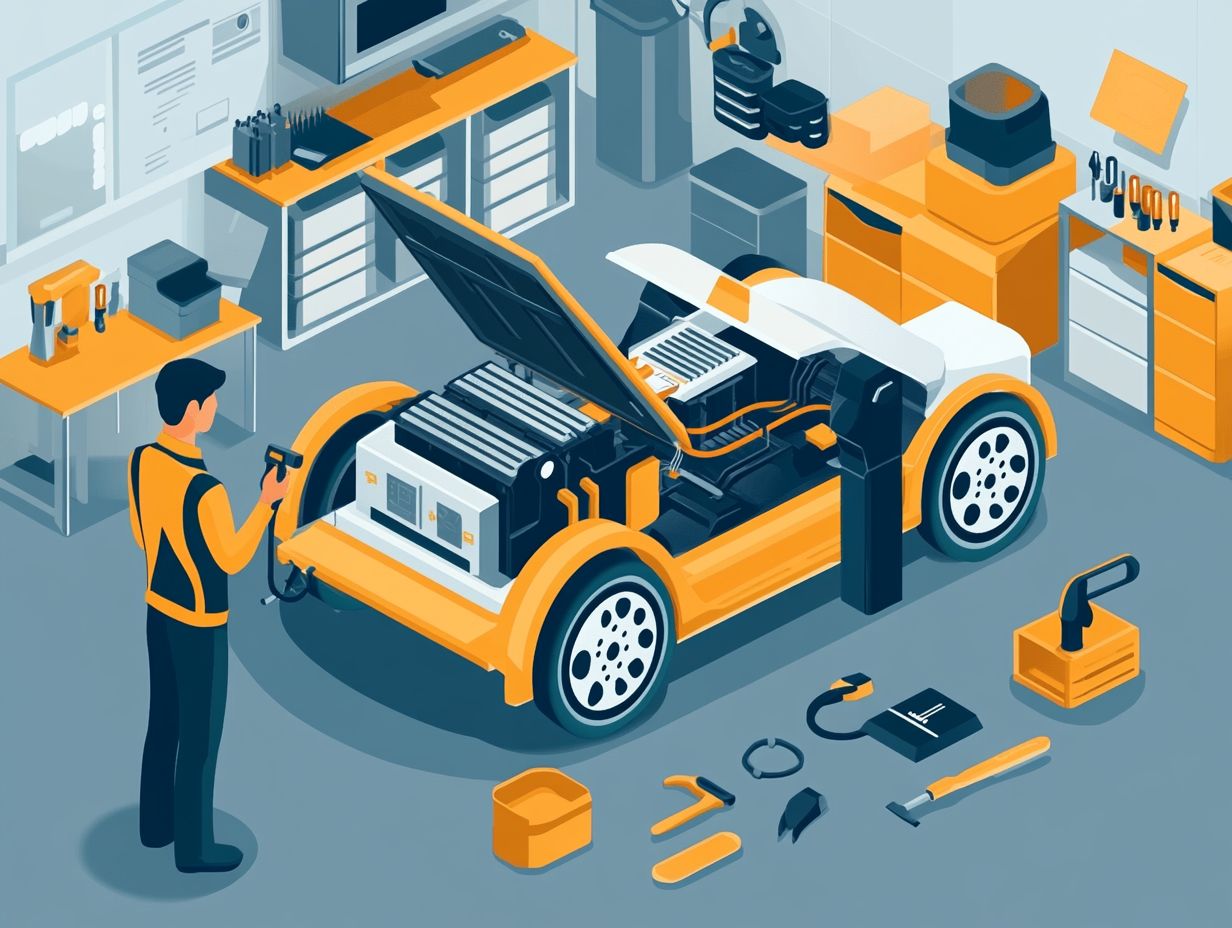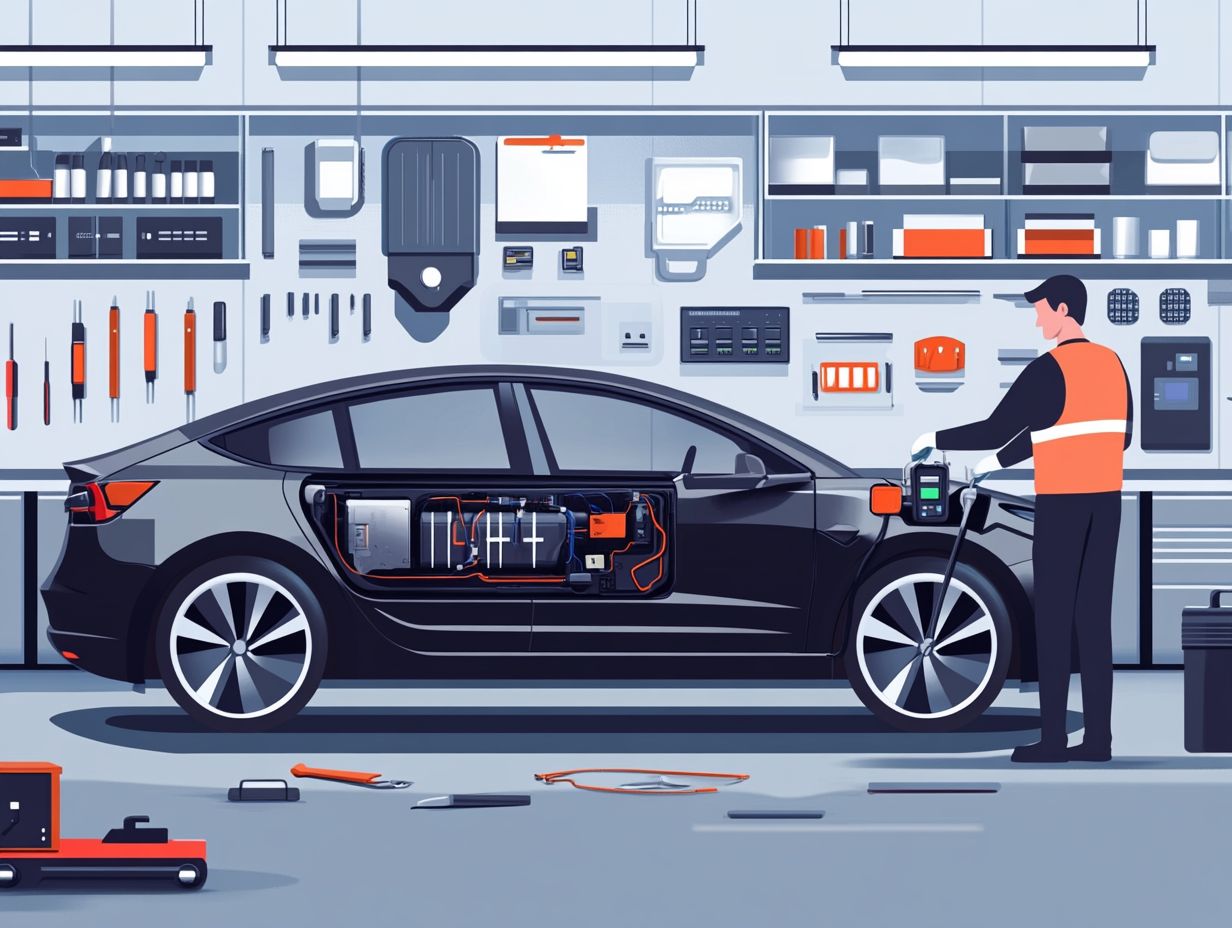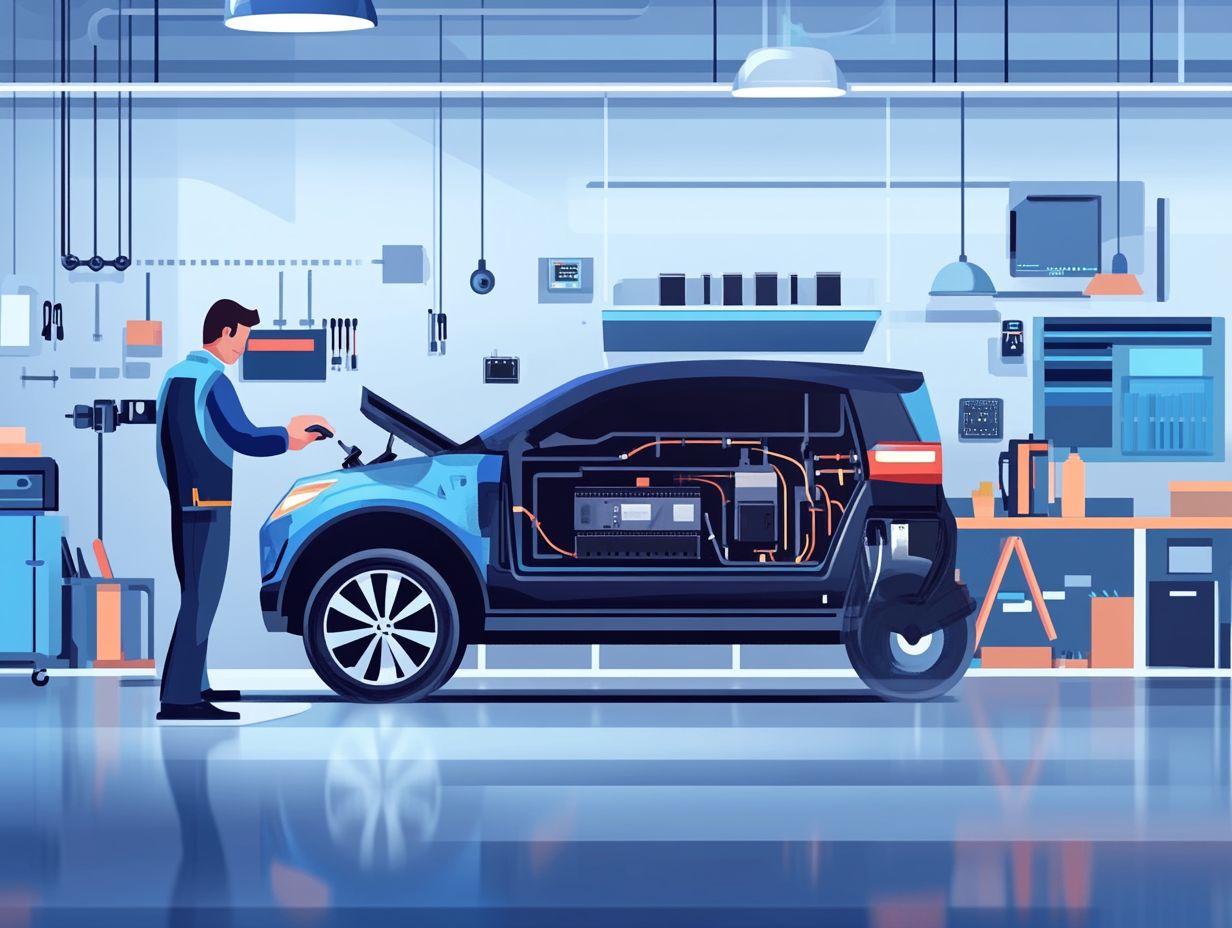how often should i service my electric vehicle?
Maintaining your electric vehicle (EV) is essential for maximizing its performance and extending its lifespan. Recognizing the significance of regular servicing can elevate your driving experience, ultimately saving you both time and money in the long run.
This guide delves into how frequently you should service your EV. It also highlights the telltale signs that it requires attention, what you can expect during a service, and the advantages and disadvantages of tackling maintenance yourself versus seeking professional assistance.
It outlines the costs involved and offers straightforward tips to keep your vehicle in prime condition between services. Dive in to ensure that your electric ride remains smooth and efficient!
Contents
- Key Takeaways:
- Recommended Servicing Frequency
- Signs that Your Electric Vehicle Needs Servicing
- What to Expect During Servicing
- DIY vs Professional Servicing
- Cost of Electric Vehicle Servicing
- Tips for Maintaining Your Electric Vehicle Between Servicing
- Frequently Asked Questions
- How often should I service my electric vehicle?
- Why do I need to service my electric vehicle?
- What does a service for an electric vehicle include?
- Can I service my electric vehicle myself?
- Do I need to service my electric vehicle if it’s still under warranty?
- What happens if I don’t service my electric vehicle regularly?
Key Takeaways:

Regular servicing is crucial for the optimal performance and longevity of your electric vehicle. The recommended servicing frequency for electric cars is every 10,000-20,000 miles or once a year, depending on driving habits and environmental factors. Signs that your electric vehicle needs servicing include unusual noises, warning lights, and decreased performance. It’s important to address these issues promptly.
Why is Servicing Important?
Servicing your electric vehicle (EV) is essential not just for ensuring it performs at its peak, but also for keeping maintenance costs manageable.
Battery electric vehicles like the Tesla Model Y, Nissan Leaf, and Chevrolet Bolt are becoming more common. Understanding the importance of regular servicing is crucial for you as an EV owner.
Unlike traditional vehicles with internal combustion engines, electric vehicles have unique needs that can significantly affect your long-term ownership expenses. By opting for regular servicing, you can catch potential issues early. This proactive approach helps prolong battery life and minimizes those unexpected repair bills.
Routine maintenance checks can improve your driving experience. This includes monitoring braking systems that recover energy, helping to enhance efficiency and performance.
While EVs generally have fewer moving parts compared to gas-powered vehicles, their specialized components still demand your careful attention.
For example, staying on top of software updates can enhance the performance of models like the Porsche Taycan or Ford Mustang Mach-E. This ultimately leads to improved efficiency and reliability.
Prioritizing servicing is your best bet to protect your investment while fostering a more sustainable future. By maximizing the lifespan of your electric vehicle, you contribute to a greener planet.
Recommended Servicing Frequency
Understanding the recommended servicing frequency for electric vehicles is crucial for you as an EV owner. This knowledge helps ensure your vehicle operates at peak efficiency.
Unlike conventional vehicles that require more frequent service due to internal combustion engines, the maintenance schedule for electric vehicles can vary considerably. Often, electric vehicles require fewer mechanical inspections and less frequent servicing. This allows you to enjoy a more streamlined maintenance experience.
Factors that Affect Servicing Frequency
Several key factors can influence how often you need to service your electric vehicle. These factors ultimately affect your maintenance costs and ensure top-notch performance.
Elements like tire pressure, the condition of your EV batteries, and the necessity for brake fluid and coolant changes will dictate how frequently you should schedule service.
For instance, keeping your tire pressure in check boosts safety and enhances energy efficiency. This simple maintenance step can reduce the frequency of tire replacements, positively impacting your overall maintenance expenses.
The lifespan and performance of your EV batteries can also be affected by temperature extremes. Therefore, it s essential to monitor battery health. By conducting regular checks and making timely replacements, you can avoid costly repairs down the line.
Additionally, paying attention to brake fluid and coolant levels is vital. Their deterioration can lead to decreased performance and more serious issues.
To stay ahead of the game, utilize onboard diagnostics and mobile apps to track these conditions. Adjust your servicing schedule proactively to keep everything in check.
Signs that Your Electric Vehicle Needs Servicing
Recognizing the signs that your electric vehicle needs servicing is essential for every EV owner. Prompt action can avert further maintenance complications and costly repair bills.
Pay attention to common indicators such as:
- Warning lights illuminating on your dashboard
- Unusual noises that disrupt your drive
- A noticeable dip in performance
These signals suggest it s time to seek professional assistance to keep your vehicle in optimal condition.
Common Warning Signs

Common warning signs that your electric vehicle requires servicing include issues with brake pads, power steering, and potential battery problems. These indicators can range from minor alerts to major malfunctions, all of which demand your immediate attention.
Take brake pad wear, for instance. It can lead to reduced stopping efficiency. Keep an eye on warning lights and listen for any unusual sounds when you brake. Power steering issues can make steering a challenge, impacting both drivability and safety.
Battery problems might show up as reduced range or charging difficulties, indicating declining battery health. If you notice any of these warning signs, consult a qualified technician for a thorough assessment.
By closely monitoring these indicators, you can plan timely maintenance to keep your electric vehicle in peak condition and operating reliably.
What to Expect During Servicing
During servicing, expect detailed checks and mechanical inspections specifically designed for your electric vehicle s unique needs.
This process usually encompasses evaluating battery health, examining brake systems, and confirming that all essential components are operating correctly.
Types of Maintenance and Inspections
As an electric vehicle owner, it s essential to familiarize yourself with the types of maintenance and inspections that keep your vehicle running smoothly. This includes checking brake fluid levels and replacing cabin air filters tasks crucial for optimal performance and comfort.
Regular inspections are key to extending your electric vehicle’s life while enhancing safety features. Schedule tire rotations and alignments every 5,000 to 7,500 miles to prevent uneven wear and improve handling for a smoother ride.
Battery health checks are essential; they ensure your battery operates efficiently, directly impacting your vehicle s range and charging times. Don t overlook regular software updates, necessary to maintain your EV s efficiency, covering everything from onboard systems to navigation.
Consult your vehicle’s manual for specific recommendations and stay vigilant for any unusual sounds or warning lights. Proactive management of your vehicle’s health ensures you enjoy every journey to the fullest.
DIY vs Professional Servicing
When maintaining electric vehicles, you often navigate the choice between DIY servicing and professional servicing, each with unique advantages and challenges.
While opting for DIY can initially lower your maintenance costs, professional servicing guarantees a level of quality and reliability that minimizes the risk of unwelcome surprise repair bills down the line.
Don t wait! Act fast! Check your vehicle for any warning signs and consider scheduling a service today!
Pros and Cons of Each Option
Both DIY servicing and professional servicing present unique advantages and disadvantages. As an electric vehicle owner, you must carefully consider these options.
Tackling maintenance tasks yourself can lead to cost savings. However, it may lack the expertise and thoroughness that professional servicing offers. This could result in higher repair bills down the line.
If you’re comfortable with basic maintenance, you can handle simple tasks like changing wiper blades or replacing cabin filters. There s satisfaction in rolling up your sleeves and saving a few bucks.
But when it comes to more complex issues, such as battery issues, it s usually wise to leave those to trained professionals. They have specialized knowledge and tools at their disposal.
If you possess adequate mechanical skills and a solid understanding of your vehicle’s systems, engaging in DIY can feel enabling. On the flip side, if you’re still navigating the intricacies of electric vehicles, opting for professional service might be your safest bet. This ensures reliable results, especially regarding warranty coverage or significant repairs.
Cost of Electric Vehicle Servicing

The cost of servicing electric vehicles can fluctuate significantly. Factors include the specific type of vehicle, the frequency of maintenance, and the range of services required.
As an EV owner, understanding these costs is essential. This knowledge allows you to budget effectively for long-term maintenance and keep your vehicle in peak condition.
Factors that Affect Cost
Several factors can influence the cost of servicing electric vehicles. These include the type of maintenance needed, the model of the vehicle, and your geographical location, which impacts labor rates and parts availability.
Understanding these elements helps you plan your servicing budget and set realistic expectations.
For example, owning a higher-end electric vehicle may mean encountering specialized components that elevate repair costs. In contrast, mainstream models often enjoy broader parts availability, resulting in more competitive prices.
Regional differences also play a crucial role. In areas with a high concentration of EVs, you ll likely find more service centers competing for your business, leading to lower prices. However, in rural locations, you might face longer wait times for parts and fewer skilled technicians.
Variations in service requirements, like battery maintenance or software updates, further contribute to the overall cost. Stay informed! Knowing what to expect based on your specific circumstances can save you time and money.
Tips for Maintaining Your Electric Vehicle Between Servicing
To keep your electric vehicle in peak condition between servicing, embrace a few key maintenance practices.
Regularly check your tire pressure and replace cabin air filters as needed. Incorporating these habits can significantly enhance your vehicle’s performance and extend its longevity.
Simple Maintenance Tasks to Keep Your Vehicle in Good Condition
Simple maintenance tasks, such as checking tire pressure, assessing brake pads, and performing coolant changes, can keep your electric vehicle in excellent condition. These tasks help prevent costly repairs down the line.
You can easily include these tasks in your regular routine. For instance, routinely monitoring tire pressure enhances efficiency, improves range, and bolsters overall safety by reducing tire wear.
Inspecting brake pads is equally crucial. Electric vehicles often utilize regenerative braking, which can lead to uneven wear if not monitored closely. Regular coolant changes are vital too; they help prevent overheating issues and prolong the life of key components.
Each of these straightforward actions contributes to maintaining peak performance and prolonging the longevity of your vehicle. This ultimately makes your ownership experience much more enjoyable.
Frequently Asked Questions
Here, we will address some common questions about electric vehicle servicing and maintenance.
How often should I service my electric vehicle?

Service your electric vehicle every 12,000 to 15,000 miles or once a year, whichever comes first.
Why do I need to service my electric vehicle?
Regular servicing keeps your electric vehicle running efficiently and safely. It also helps catch potential issues before they escalate.
What does a service for an electric vehicle include?
A typical service involves checking and replacing fluids. It also includes inspecting and rotating tires, as well as a general diagnostic check.
Can I service my electric vehicle myself?
You can perform some maintenance tasks on your own. However, it s best to have a trained technician handle the service for complete peace of mind.
Do I need to service my electric vehicle if it’s still under warranty?
Yes, follow the manufacturer’s service schedule even if your vehicle is under warranty. Neglecting this could void your warranty.
What happens if I don’t service my electric vehicle regularly?
Neglecting service can lead to decreased performance and reduced battery life. It may also result in costly repairs down the line.






